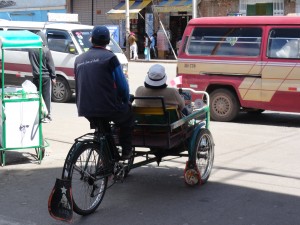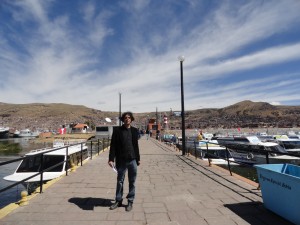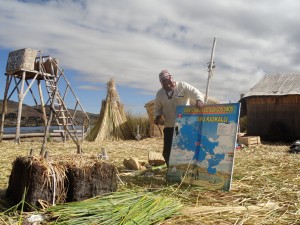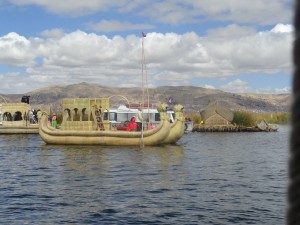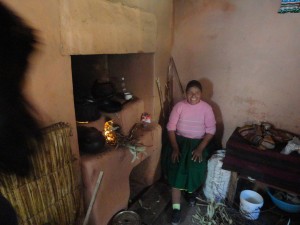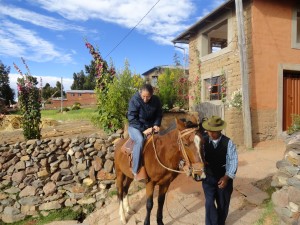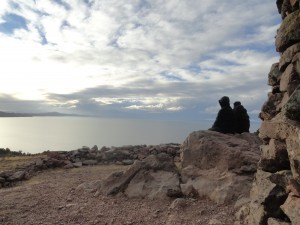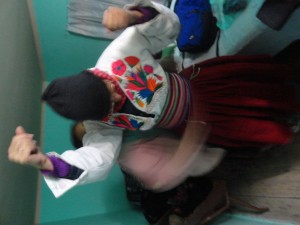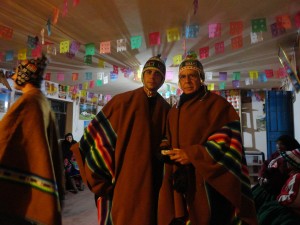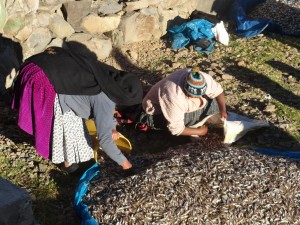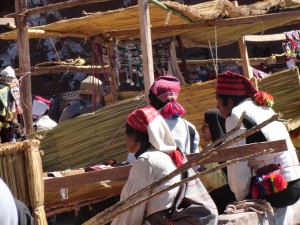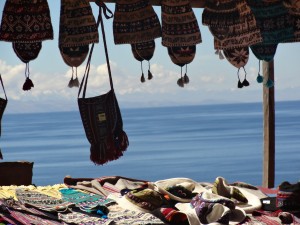Since my last missive, we’ve been to Puno and back. I finally have some time to write. The Marinas are off on their adventure to Machu Picchu. I could’ve gone a second time, but I figured it’s such a huge hassle to go and it’s so expensive, I decided to stay here and pack up the room, get some gifts (free from Peter’s condemning eye) and watch Galaxy Quest for the umpteenth time. Besides, it’ll be fun for them to do it as a family, like in the old days when they would all go to Pensacola in an RV.
We left for Puno early on Wednesday morning. Patrick and Marcy stayed behind in Cusco for some ‘alone time’ and they left Friday morning for home. I’m sure that when the plane landed at JFK, Patrick let out a big “Thank Gaahd!”
Our bus left late, but that was OK. It was a double-decker, direct-to-Puno bus. The ride was beautiful — snow-capped mountains, regular mountains and as much sky as I’ve ever seen. Since we were so high up, it seemed like the clouds were really close. The bus was comfortable and we were prepared: I had sandwiches and snacks for the seven-hour trip. All was going smoothly… until, for some reason, and Peter speculates it’s because some woman must’ve said something to the bus driver, the air conditioning was turned off. As the ride went on, the bus got warmer and warmer. At first, Peter tried to open the little sliver of a window we had over our seat, but the women behind us complained that it was too cold. Which of course only reinforced his theory that some woman had complained about the air conditioning. We began to swelter in our seats. We eventually decided to disregard the protestations of the female passengers directly behind us and we tried to open the window, only it wouldn’t stay open. By this time, everyone was starting to moan from the heat. There were only a few windows on the bus and everyone was opening them and trying to get then to stay open. None of the damn windows would stay open. The hinges wouldn’t snap into place. So the windows were just flopping open every now and then, occasionally allowing a little bit of fresh air to pass into the bus, a fleeting respite, before slamming shut again. One man actually held his open over his head for as long as the blood would keep in his fingers. Finally, one guy decided to use brute force and he got the window to snap open. BAP! The whole bus heard it and then, anyone near a window was applying the same brute force. BAP! BAP! BAP! We got them open! Just then, the bus driver stopped the bus and told everyone to close the windows so he could put on the air conditioning. Windows that are a struggle to open are also a struggle to close. Peter had to apply his full body weight to the latch to get the hinge to bend. He practically had his feet on the ceiling for leverage. He was applauded for his effort.
We pulled into Juliaca which is about an hour outside of Puno. It looked a lot like Piura; poor, dirty, flat, and did I mention poor? There seemed to be only one paved road and we were on it. All the crossroads were unpaved and extremely hazardous looking; trash and Peruvian rickshaws were everywhere. When you see something like that, you just have to wonder at what kind of luck it was to be born somewhere other than THAT place. Once we got through Juliaca, we continued onto Puno. The landscape was still lovely, but the ground was riddled with trash and the living conditions looked poor. The land was also dotted with blue outhouses. You know this place didn’t look like this before the white man came. There’s no way. They really seemed to have lost their way. (Even the old Inca way of laying stones is gone. Nobody knows how they did it since, once the Spanish took over, the Inca used the European mortar and brick method, probably because it was cheap and easy. Back in the 1950s, when they had a huge earthquake, the only walls that remained standing were the Inca walls. )
Once in Puno, we took a Peruvian pedicab to our hostel for two soles. We sat in the front and the pushbike driver huffed and puffed behind us. It was slow, bumpy and a little wobbly on the turns. I’m pretty sure I didn’t like it. We also took the motorcycle Peruvian rickshaw later that day. That was way less scary. The hostel we picked was more of a B&B, the proprietor is the sweetest thing, and she’s like universal mom. She made us coca tea and showed us to our room. It had one of those lovely one-demand hot water things, only this one, you had to turn the water on, flip a switch and when you were done, you had to flip the switch before you shut the water off and since you were in the shower at that point, you were flipping the switch with a wet hand. Now that’s what I call safe! Obviously, since I’m typing this, I survived.
Puno is higher than Cusco, it’s over 12,000 feet. It’s also way chillier at night. I’ve actually had to use my poncho and Peter actually had to purchase a sweater. I look ridiculous in my poncho, but I was basically walking around in a big wool blanket with a hood, so I didn’t care. Puno is also not near as pretty as Cusco. It’s flat and pretty boring. Lake Titicaca itself, from the shores of Puno, is unremarkable. It’s pretty, but, you know, it’s a lake.
Anyway, Peter and I had our first altitude-induced bad night’s sleep. At about 3 am, we were both awake, gasping for air like a couple of beached fish. It was awful. We didn’t sleep much at all. We were OK once we started moving around, but my word, it was miserable. And it’s hard to get warm in Puno. Nothing is really heated and my clothes aren’t thick enough. On top of that, I stupidly left my anti-boat nausea patches at the hotel in Cusco, so I was very worried about the three-hour boat ride.
We spent most of Thursday trying to suss out the whole getting to the islands thing. Lake Titicaca is home to several indigenous tribes. There are about 50 floating islands and the Uros people inhabit them. The islands are made of these reeds called the totora which is about a quarter to half inch in diameter and that, if you look at a cross section of one, looks a lot like a sponge. I guess they’ve been living like that for centuries. They initially started to live on the floating islands to get away from the Incas and the Collas. So, anyway, we knew we wanted to see them and then, there are a couple of other solid islands we wanted to see as well. One was called Isla Taquile and the other is Isla Amantani. Taquile is more touristy than Amantani. Both offer overnight stays with families, but Amantani hasn’t been doing it as long as Taquile so it’s a bit more authentic. Also, a lot of the tour books recommend not using tour guides to go to these places since they have a tendency to undercut the families so we had to figure it out ourselves. From what we figured, we were going to spend about 80 soles a piece, which is less than $30 USD for the boat ride, the admission to the islands, lunch, dinner and breakfast included along with a bed. Not too expensive.
We spent our last night alone on this trip sucking down coca sours and eating mediocre pizza. Peter’s dad and sister arrived the next day, Friday.
I have to say, it was actually nice to see family. We walked them around Puno a bit, but since they were coming from New Orleans, via Lima, we knew the altitude would whack them, so we took it easy. His dad just got really tired but his sister had a stronger reaction to it. She got woozy and super super tired. By the next morning, she was mostly OK and he was fine. We had to get to the boats for 7:30 am. We ended up on Señor Smiley’s boat. We call him that because no matter what he was doing or saying, he was always smiling and he punctuated everything with a “No hay problema.” Señor Smiley also smelled a little ripe. Well, maybe not a little ripe. Even the fresh air of Lake Titicaca couldn’t ameliorate that smell. Surprisingly, though I was without my anti-nausea patch, I didn’t get too sick. Only when Señor Smiley got too close did my stomach spasm.
Our first stop was one of the floating islands. My first step out onto it was a shocker. It was super squishy. Intellectually, I’m sure I thought it would be squishy, but actually stepping onto it was weird. About six feet of reeds rest on what looks like a loam of some sort and it all just floats on Lake Titicaca. It feels solid, it doesn’t rock, but man, is it ever squishy. The man of the island greeted us and he invited us to sit on these reed benches and he proceeded to tell us a bunch of stuff about how the islands are made and information about the lake and my Spanish must be better than I thought because I got most of it. He even cracked a joke about the name Titicaca, saying that the first part “Titi” was for Peru and the last part “caca” was for Bolivia. (It actually means rock puma or something like that.) It seems that the islands only last about 50 years or so and they’re under constant maintenance to last that long. To make them, they have these squares of loamish stuff that they tie together and then plant the reeds on them. Once the reeds take root, they tie all the squares of reedy loam together and then start piling on the reeds and they replenish them as they rot, which is why it’s all so squishy. They use the reeds for everything. They make boats and houses and I think parts of the reeds are edible. They also can cook on the islands, but they have a clay stove sitting on top of a lot of the loam-like stuff to keep the reeds from catching fire. When you look at it all in toto, outside of the tapestries and the people, it’s all a monochromatic beige color with this bright blue sky above and dark water below. Oh, and the coolest thing about their houses is they’re super moveable. Apparently, they like to pick them up and move them around, depending on which way the wind was blowing to keep the air as fresh as possible or to keep it as warm as possible, depending on the season.
After the 10-minute lecture, we were allowed to walk around, his wife and daughters were selling stuff and then we could either ride on our boat to another island, or he would charge 10 soles to take you over in his reed boat. I was feeling pretty OK about the whole boat thing but I wasn’t willing to risk any weirdness when it came to being on water, so we stayed on our boat and went to the second island.
The second island was called the ‘capital’ and it was a lot bigger and seemed to have a lot of other people living on it. It also had a few restaurants. I, unfortunately, had to use the bathroom. That was fun and it was also my first indication of what we were in for as far as bathroom facilities go. It was a standard outhouse setup, and there was a porcelain commode, but it was not hooked up to any water pipes. To flush it, you had to grab this small bucket that was in this really big bucket of water and dump water into the toilette and I had to assume it was all going into Lake Titicaca. There were also chickens wandering in and out of the outhouse. It was strange to share that space with a clucking hen.
At about 10 am, we got back into our boat for our three-hour trip to Amantani. Before we left, we noticed that there were tons of other boats all docked at the various islands. We assumed that of the 35 or so boats that leave every day out of Puno during peak season, each island might get one to two visits a week from the boats. With the five soles per person entrance fee and at about 30 people per boat, along with whatever trinkets they sell, they probably make more than they would without the tourism. But who knows what it’s doing to their tribe. Well, I suppose you can guess what it’s doing to their tribe.
The ride to Amantani was loooooong. I did OK. I could even sit inside (where it was warm) for the most part and I didn’t get sick until we got closer to the island and had to go through the wakes of the other boats that all seemed to be traveling faster than Señor Smiley’s boat. I made sure I was first off the boat. Then I felt better. When we got there, a bunch of the local people were standing on the dock waiting for us. Señor Smiley assigned us all someone to go with. We got a girl named Vicky. I’m sure she had a Quechua name that we couldn’t pronounce, but Vicky was what she told us to call her. We followed her to her house, which was up a hill and to the left. It was a nice house and we got our own bedroom and Peter’s dad and sister had their own room. We dumped our stuff in our rooms and headed downstairs to the kitchen area where Vicky was starting to make lunch. She used a clay stove and started the fire with eucalyptus leaves and branches. It smelled wonderful. Of course, there was the inevitable “Donde esta el baño?” and she pointed to a little building out in the garden. Ugh. An outhouse. It wasn’t too terrible though. It was new, had nice white tiles, a sink, a toilette and a showerhead. Unfortunately, none of it was hooked up to water. Yup, there was a little bucket inside a big bucket. {sigh}
Lunch was tasty though starchy. We had a quinua soup and for the main course, we had home-grown purple potatoes, a fried egg and a few slices of tomato. Those were the best potatoes I ever ate. What the hell do they sell us in the States? Because it sure as hell didn’t taste like what we had on Amantani. Afterwards, we rode horses (for a nominal fee of course) up to the top of their mountain so we could watch the sunset, which happens at around 5:30 pm or so. The horse ride was scary. I hadn’t been on a horse since before my surgery and I was terrified I was going to fall or get so bounced around my head would ache for days. My horse’s name was Tornado, which was appropriate because he was very gassy and was making lots of wind. He also loved loved loved to skirt the edge of the path so that I felt like he was going to slip and fall into the ravine at any moment. Also, these horses were trained for pull on the left, go left type of steering. In the US, I remember it being different where you had to pull both straps in the direction you wanted to go to get the horse to turn. Tornado was getting pretty confused with all my willy nilly tugging.
[Oh, as an aside, I’ve noticed something. As you know, the toilets flush in the opposite direction down here (when there’s water, ‘natch). I’ve also noticed that I kept reaching for the wrong silverware at a restaurant table and I finally realized that they place the silverware on the right instead of the left. I wonder if the two things are connected. Hmmmm…..]
Anyway, we only had three horses and there were four of us, so we took turns riding up the cliff. The guys who were accompanying us were just zipping along, shushing the horses and slapping their fannies when the horses hesitated. They were also all listening to little hand-held transistor radios because it was the semi-finals of the American cup and Peru was playing. I kept hearing “Goooooooooooooooooooal!!!!!!!!!!!!!” Turns out Peru won, 4 to 1. They ended the cup in third place behind Paraguay and Uruguay.
When we got to the top, our guys were barely winded. We said goodbye and walked around this sort of stone fortress thing. There were some women laying out small potatoes and others were selling the usual things and a bunch of little girls selling those little woven bracelets. They would swarm you, just saying “Por Favor” and my word it was hard to resist them. Peter’s dad is a huge softie and he ended up buying a few of the little bracelets. The fortress thing at the top of the mountain was built over six years without any machines. Oh yeah, there are no cars or anything on the island. Maybe a motorcycle or two, but that’s it. They hauled all those stones up to the top of that mountain on their backs! And they only did it for the tourists. I hope it worked out well for them. It certainly did give us all something to do between lunch and dinner.
I have to pause here for a minute to describe what I’m hearing. I’m typing in this second floor room in the front of the hostel. It faces the plaza and all afternoon, there’s been a bunch of folks selling stuff and that horsy music playing from loudspeakers. Well, for the last 30 minutes or so, the music has stopped and there has been what sounds like a church service. There was a man’s voice leading and there were responses by a bunch of women. After that, some sort of Christian music started. What’s worse, horsy music or Christian music? I haven’t a clue.
Anyway, back to Amantani.
The sunset was only so-so and we had to get back to the plaza so we could meet Constantino so he could lead us back to the house and we had to get to that plaza before dark because there aren’t any streetlights. They had tried to have streetlights, and there are actually physical streetlights on the island, but there’s no juice for them. Seems they used to have generators but the oil got too expensive and they gave up on it. If there is any electricity, it is powered by solar panels and it’s mostly only done on a building-by-building basis. Constantino met us at some time around the time he said he would (they’re not very exact about anything here). He looked quite dapper. He was wearing a nice hat and shirt, a vest, slacks and sandals. He led us back to the house. Along the way, we bumped into a couple that was on our boat and they were wandering around looking for the house they were staying in. They were seriously lost. The layout of the island is very confusing. Since there are no roads, they only built the paths that they needed. There are no street names or arrows or signs of any kind. You just have to know where you are going. Lucky for them, Constantino led them to their house. We got to our house and sat in the kitchen while the women cooked dinner.
Vicky was only the daughter of the house’s owner. She was one of seven children and she had one kid of her own. Most of her siblings were off and married or in school in Puno. (The school on the island only goes up to 5th grade. If anybody wants more than that, they have to go to Puno.) Her mom and dad and her mom’s mom live in the house with Vicky’s youngest brother, Vicky and Vicky’s kid. Her parents were young by my standards. Her dad was 52 and her mom was my age, 47. I looked at her and was like, ohmygawd, she had seven kids and was a grandma and I’m childless and married to a 35-year old. Yikes.
Their Spanish was only so-so, according to Peter’s dad. Their primary language was Quechua though they couldn’t read or write it. Everyone in the house at least understood Quechua, but the littlest ones only spoke Spanish. They don’t teach Quechua in the schools, though, that is beginning to change. Peru has started to require Quechua education in the schools so the culture won’t be totally lost, though a whole generation has already lost a goodly portion of it. Also, there are no doctors on the island. If they need a doctor they have to go to Puno and they told us lots of folks died before they got there. Vicky herself has something going on with her ovaries, probably fibroids, and she’s unable to lift anything too heavy. Doctors Without Boarders, or something like them, needs to make a serious trip down here to these islands.
Anyway, dinner was the quinua soup (again) and a plate of rice, potatoes and some dried fish with a little bit of tomato. Peter’s sister was feeling poorly again and was in bed sleeping. We spoke with the man of the house for a while about how all the tourism affects them and their culture. According to him, the tourism has been great for them. They have a lot more things that they’ve needed like plates and glasses and it brings in money for them that they couldn’t make with just farming. He didn’t feel like it was destroying their culture. They’re very proud of their culture, but he can’t really see what damage the tourism might be causing through all the benefits he’s getting from it. He was a very sweet man. I mean really sweet. They all were. They were just genuinely calm and accepting of having us in their home. It’s just an economic reality for them and they make the best of it. After dinner, they asked us if we would be willing to wear costumes for the party that night. Every night, for the benefit of the tourists, they bring in musicians and there’s dancing and beer to be purchased for consumption (though, hell no, because beer makes you pee and I didn’t want to have to use that outhouse too often). I sort of said no, uh-uh but somehow, she appeared out of nowhere with all these clothes and she had me dressed in a skirt, a blouse and a tight woven belt before I could say “Que what?” Peter and his dad got off easy. They just had to wear one of those goofy knitted hats and a poncho. Guys always get off easy.
They had their son be our sherpa for the night and he led us, in the dark, to the little party place. The party was kind of goofy and the dancing basically entailed a Hava Nagila type of dance where the women were supposed to spin their skirts around. The band was pretty good though the three of us (Peter’s sister opted out) only stayed for a little while. We were way more interested in looking at the stars. We had our sherpa kid lead us back to the house (I suspect he was grateful. He wasn’t too interested in the dancing. He dutifully danced when the music played but when it stopped, he snuck outside to play with his cell phone.) We really wanted to star gaze before we went to bed. See, the island has zero light pollution and it’s in the middle of Lake Titicaca. You can imagine what we saw. We saw the frickin’ Milky Way! No shit! We really did! We thought it was just a passing cloud, but after a few hours, when it didn’t dissipate, we realized it was the frickin’ Milky Way! And there were no satellites and no air traffic and no moon so it was muy muy clear. Talk about feeling small. How can anybody think for a second we’re the only sentient beings in the universe? There are just too many stars for there NOT to be life elsewhere. And we’re trapped here on this little rock why? Oh, yeah. I forgot. BECAUSE WE SPEND ALL OF OUR RESOURCES FIGURING OUT HOW TO KILL EACH OTHER MORE EFFICIENTLY.
{sigh}
Anyway, the night wasn’t as cold as we thought it would be, but I did have to pee in the middle of the night and well, that was special. But at least I got another look at the stars.
The next morning, Peter’s dad and I were the first up, so we walked around a bit and watched the fisherman unload their fish. I don’t know what kind of fish they were but they were small and smelt-like. The fisherman just made these huge piles of the fish and women kept coming down with buckets and scooping them up and strapping them to their backs with a blanket and hiking away with them. We didn’t notice any exchange of money. It just really seemed communal. I suspect they take the fish and lay them out to dry. The house we were staying in had a pile of fish drying next to a pile of potatoes outside in the garden. (They also had a couple of big plastic bins with what looked like that spit beer in them. I forgot to confirm that though.) And these women, up and down these steep hills, many of them older and barefoot, they all have cankles. Their ankles are thick with muscle from walking on stone paths their whole lives. We headed back up for breakfast (pancakes and yay! Coffee). We were supposed to be at the dock for 8 am but my father-in-law really charmed them because they were giving him stuff to give his wife, giving him their address so he could write or come directly to them the next time he came down here and before you know it, we were late. By the time we got to the dock, the boat had already pulled away. Luckily, a bunch of ladies on the dock were able to scream loudly enough and the boat turned around to pick us up. It was really embarrassing.
After that, we headed over to Taquile for lunch. (Of course, someone on the boat had to make a wisecrack. We were supposed to be back at the boat for noon and they turned to us and said “And for you, that means 12:15.”) Peter’s sister opted out of the steep climb up to the town. I don’t blame her. Half way up, I wished I had stayed down by the boat myself. It was a rough climb with very little reward at the end of it. We didn’t really feel like we had time to eat and the only thing to do was shop. The folks on this island were dressed a little differently than on Amantani. On both islands, the women wore full, black skirts with white embroidered blouses and their black head coverings went down to their calves. On Amantani though, the head coverings had embroidered edges. On Taquile, the black head coverings had pompoms on the end. The Amantani men dressed sort of dapper-like with vests and slacks while the men on Taquile had more ornate clothing as well as knitted caps they make themselves. It seems that the style of the cap indicates the man’s stature in the society, though I couldn’t tell you what a white hat with a red pompom means as opposed to a red cap with a white pompom. But that’s all there was to do there. We went back to the boat and settled in for our long boat ride back.
I parked myself on the back of the boat so I could see the horizon clearly in case I got sick. I talked to a few of the other folks on the boat. One group was from California. They were chatty and friendly and I spoke with Dutch couples that were also quite pleasant. (Their bus story nearly topped ours. They were in the northern part of India on a bus and apparently, not only was the bus so rusty you could see the road through the floorboards, but every 15 minutes, the bus would stop so the driver could get out and pour water on the engine.) Most of us had the same experience on the island; no running water, no heat, no meat and a generally positive experience. We were all jonesing to wash our hands in soapy water though. I got totally sun burnt on my face but I didn’t get sick! It was a miracle. Also, Señor Smiley smelled better. Seems he took the time that we were on Taquile to bath himself in Lake Titicaca.
We got back to Punos at about 3pm and had to wander around until our bus for Cusco left at 10pm. We decided to buy pharmaceutical quality valerian root pills for the ride and we made sure we consumed a considerable amount of alcohol so we could sleep. It worked splendidly. We all slept through most of the bus ride and were really surprised when the bus driver came up to us and said “Tu tienes mochillas?” because we were in Cusco and had to get our bags.
I have to say; the whole experience was worth it, despite my misgivings about us gringos spoiling their culture. We learned a lot from them, we saw a lot and really got an idea of what living so simply in such a strange place is like. And as far as they’re concerned, they benefit from us. This island tourism thing only goes on for about three months out of the year. The rest of the time, their lives are their own as they have been for centuries; they farm, they deal, they live, they love. Nothing is so different nine months of the year for them, except that now, they have plates and forks and cups. Is that so bad? Maybe not. And maybe because the tourism is so important, maybe that’s why Peru is stepping up to do what they can to preserve the culture. And that’s a good thing. I’m not saying I think floods of people should come down here and do this. Most folks don’t know how to be responsible tourists. And I definitely wouldn’t want to see a Hilton or Sandals pop up on the coast here and build a huge fence around a disgusting resort that keeps the indigenous away from the land that belongs to them while showering privilege and poshness on people that don’t really appreciate what’s around them. But as long as people appreciate what is here and are respectful, that might just be fine.
I can’t believe our odyssey is nearly over. I may not get around to writing about Lima until we get home. I just don’t know how I’ll manage it. We get to Lima on Thursday afternoon and leave Saturday night. His dad and sister leave Saturday morning, so there’s going to be some awkward wandering around on Saturday for me and Peter. We’re both pretty anxious to get home. I doubt we’ll be able to focus on much.
Now I’m left with some last minute shopping, finalizing our tickets to Lima and waiting for the Marinas to return. This morning, Wednesday, at 6 am, I was jarred awake by several loud explosions, mere precursors to the two-day celebration of the Independence from Spain. We’ll be in Lima for that and then, on Saturday, it’s back to the states. We should arrive at 9 am on Sunday in Chicago, which will put us on our couch with our dog somewhere between 3 pm and 5 pm, depending on if we go grocery shopping before we pick up the dog. See, once we get her, we’re not going to want to let her out of our sight for at least 24 hours. That poor dog has no idea the lovefest she’s in for.
Yes. I know. We’re dorks.

